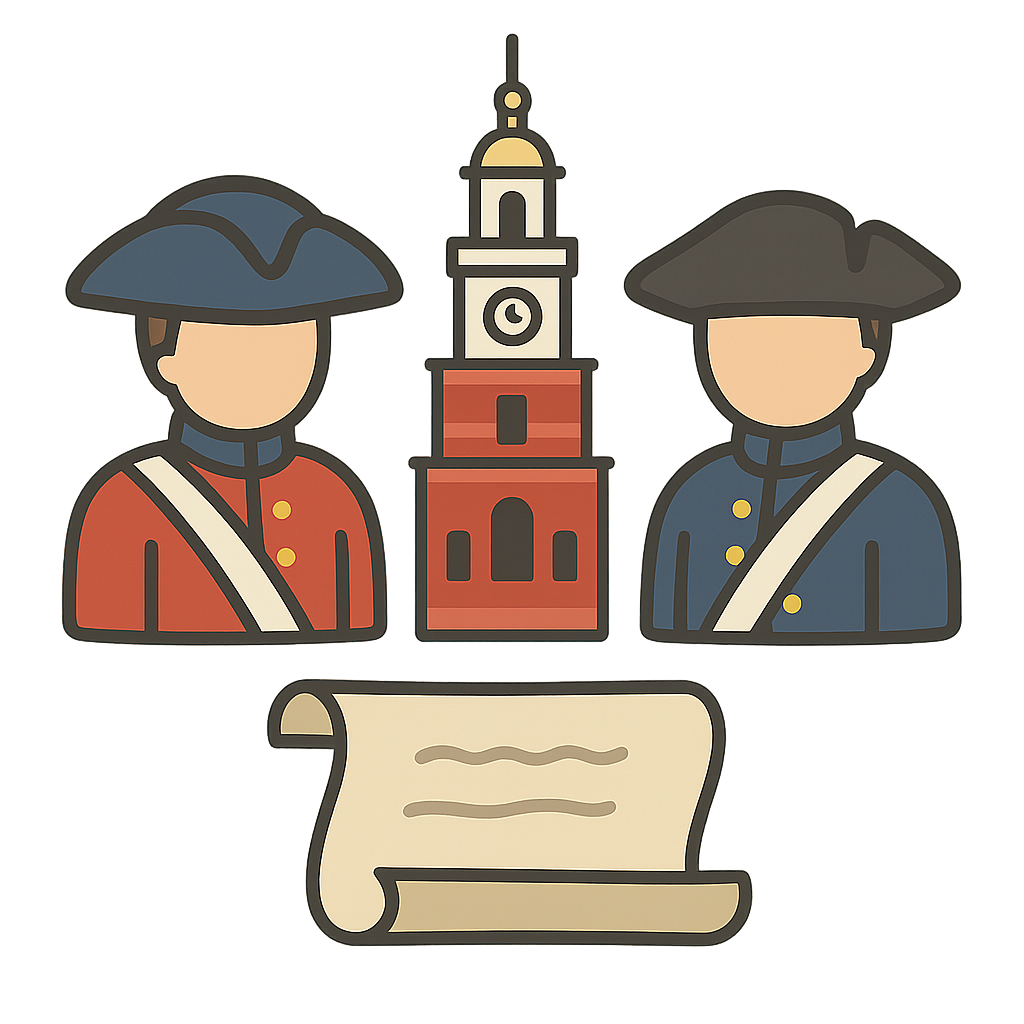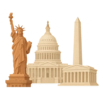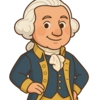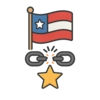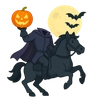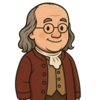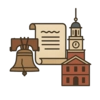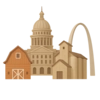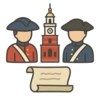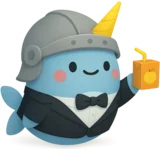A General's Journey: My Fight for American Freedom
My name is George Washington, and before I was a general or a president, I was a farmer. My heart belonged to my home, Mount Vernon, a beautiful plantation nestled on the banks of the Potomac River in Virginia. I loved the rhythm of the seasons, the smell of the soil, and the satisfaction of a good harvest. But a shadow was falling over my beloved land and all the Thirteen Colonies. A king, George III, sat on a throne an entire ocean away, making rules for people he would never meet. He and his Parliament imposed taxes upon us—on our tea, our paper, our daily lives—without ever asking for our consent. We called it 'taxation without representation,' and it felt deeply unjust. It was as if a stranger were reaching into our pockets and taking what he wanted. We sent letters and petitions, hoping our voices would be heard, but they were ignored. A feeling of frustration grew in my heart and in the hearts of my fellow colonists. We were Englishmen, we believed, and we deserved the same rights and freedoms as those living in Britain. The idea that our liberty could be taken away by a distant government was something we simply could not accept.
That simmering frustration finally boiled over into open conflict. On April 19, 1775, the news reached us like a thunderclap: British soldiers and colonial militiamen had exchanged fire at Lexington and Concord in Massachusetts. The war had begun. Soon after, I traveled to Philadelphia to attend the Second Continental Congress as a delegate from Virginia. The mood in the city was a mixture of fear and determination. We were a collection of colonies, not yet a unified country, and we were about to challenge the mightiest empire on Earth. It was there, in the Pennsylvania State House, that my life changed forever. John Adams of Massachusetts stood and nominated me to be the Commander-in-Chief of our newly formed Continental Army. A hush fell over the room. I was stunned, and frankly, I felt unworthy of such an enormous trust. I was a farmer and a former colonial officer, not a seasoned general prepared to fight a global superpower. But I saw the hopeful faces of my countrymen, and I knew I could not refuse. I accepted the command with a heavy heart, fully aware that I was risking not only my life and my fortune, but the very future of American liberty.
Of all the trials we faced, none tested our resolve like the winter of 1777-1778 at Valley Forge. It was a place of incredible suffering. The cold was a physical enemy, seeping into our bones through threadbare uniforms and worn-out boots. Many of my men left bloody footprints in the snow because they had no shoes at all. Our log huts offered little protection from the howling wind, and the smoke from our fires stung our eyes. Food was scarce; some days we had nothing but firecakes, a miserable paste of flour and water cooked over the embers. Sickness swept through the camp like a phantom, claiming far more lives than any battle ever had. I walked through the camp every day, my heart aching at the sight of my starving, shivering soldiers. I wrote desperate letters to Congress, pleading for supplies. Yet, amidst the despair, I saw an unshakeable spirit. These men believed in our cause. They held on. That winter, a Prussian officer named Baron von Steuben arrived. He didn't speak much English, but he knew how to train soldiers. With a booming voice and relentless drills, he transformed our ragged volunteers into a disciplined, professional fighting force. He taught them how to march in formation, how to use their bayonets, and how to fight as one. Hope, like the first green shoots of spring, began to return to Valley Forge.
Before that difficult winter, however, our cause had been on the brink of collapse. By the end of 1776, we had suffered a series of devastating defeats around New York. Morale was at an all-time low, and my soldiers' enlistments were about to expire. I knew we needed a victory, something to remind everyone what we were fighting for. I devised a daring, almost desperate, plan. On Christmas night, December 25, 1776, we would cross the ice-choked Delaware River and launch a surprise attack on the Hessian mercenaries garrisoned in Trenton, New Jersey. The weather was atrocious. A fierce storm raged, lashing us with sleet and snow. The river was a treacherous obstacle, filled with large chunks of floating ice that threatened to crush our wooden boats. My men were exhausted and freezing, but their determination was a fire against the cold. We moved in near-total silence, the only sounds being the crunch of snow underfoot and the groaning of the ice. We fell upon the Hessians just after dawn, achieving complete surprise. The battle was swift and decisive. It was not a large victory in military terms, but its impact on our spirit was immeasurable. It was the spark of hope that rekindled the flame of revolution, proving to ourselves and to the world that the Continental Army was not defeated.
Years of hard fighting followed that night. There were victories and defeats, moments of hope and seasons of despair. But we persevered. Finally, in the autumn of 1781, our moment came. The main British army in the south, under the command of General Cornwallis, had marched into Virginia and fortified themselves in the port town of Yorktown. It was a strategic blunder, and I saw our chance. Working in perfect concert with our French allies, we devised a plan to trap him. I marched my army south with incredible speed, while the French fleet, commanded by Admiral de Grasse, sailed to the Chesapeake Bay, cutting off any chance of a British naval rescue. We had them surrounded. The siege of Yorktown began. For weeks, our cannons and the French cannons roared day and night, pounding the British defenses. The air was thick with smoke and the constant thunder of artillery. My men, now seasoned veterans, dug trenches and advanced steadily, their spirits high. Finally, on October 19, 1781, the bombardment ceased. A lone British drummer boy appeared, beating the signal for a parley. The British were ready to surrender. As their army marched out to lay down their arms, their band played a tune called 'The World Turned Upside Down.' It was a fitting melody for a moment that changed the course of history.
Winning the war was one thing; building a nation was another entirely. The surrender at Yorktown marked the end of the major fighting, but our work was just beginning. We had to create a government that would protect the liberties for which we had fought so hard. It was a monumental challenge. We were no longer subjects of a king but citizens of a republic, responsible for our own destiny. We debated, argued, and compromised to write a Constitution, a framework for a government 'of the people, by the people, and for the people.' I had longed to return to my quiet life at Mount Vernon, but my country called upon me one last time, electing me as its first President. I served because I believed we had to prove that our grand experiment in self-governance could succeed. The American Revolution was more than a war for independence; it was a promise. It was a promise that a nation could be founded on the ideals of liberty, equality, and justice. Upholding that promise is a task that falls to every generation. The freedom we won was not a gift, but a responsibility—one that I pray you will always cherish and defend.
Activities
Take a Quiz
Test what you learned with a fun quiz!
Get creative with colors!
Print a coloring book page of this topic.

